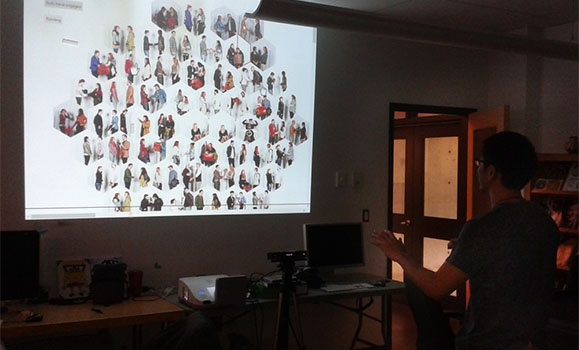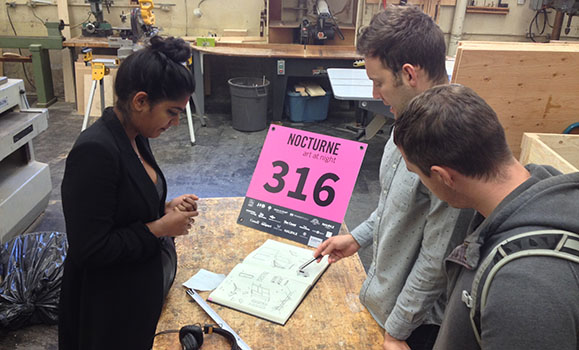If there’s one Halifax night that’s completely unlike any of the other 364 each year, it’s Nocturne.
Now in its eighth year, the annual arts festival throws open the doors to the city’s art galleries and floods streets and public spaces with installations from local artists of all styles, sensibilities and media. Free for all to attend, the event draws thousands of people to downtown Halifax and Dartmouth each year, creating an energy in the city that’s truly unique and infectious.
And you’re planning on checking out this year’s event on Saturday night, you won’t want to miss a whole suite of Dalhousie-linked projects, covering everything from the building of a real-time social network to a chance to create architectural ideas for one of Halifax’s downtown institutions.
Social networks at the Central Library
One of the hottest Nocturne destinations is certain to be the Halifax Central Library, given that it’s the first year the new building has been part of the festival. And it’s there that visitors will find two of Dalhousie’s installations.
The first involves someone whose work will be quite familiar to regular Nocturne attendees: Derek Reilly, assistant professor in Dalhousie’s Faculty of Computer Science. This will be the fourth Nocturne for Dr. Reilly and his students, who each year bring a unique activity that explores human-computer interaction. (The installations are meant to provide research insights to the team.) Their past installations have included a human “pong” game and an interactive video game linking Twitter and Tetris — “Tweetris” — which won the festival’s first Artist Award in 2012.
This year’s project is called “Are We Really Strangers?” and builds on a 2014 Nocturne installation by photographers Damian Lidgard, órla MacEachern and Hannah Minzloff. Last year, at the Canadian Museum of Immigration at Pier 21, the trio photographed over 500 strangers interacting for the first time.
This year, the photographers have teamed with Dr. Reilly and his students at the Graphics and Experiential Media (GEM) Lab to add a digital component to the project. At the pop-up studio in the Halifax Central Library, strangers will be photographed meeting for the first time. Those portraits will be showcased on a large, interactive digital display, and attendees will be able to manipulate the images to draw connections with people they know or recognize.

“The idea is that eventually some of those strangers will end up having those friend-of-a-friend relationships. When the system does that, the honeycombs will glow, with animations showing the map of relationships that link those people together,” says Dr. Reilly, whose project involves the work of several postdocs, graduate students and undergrads.
“We’re focused on the notion that everyone knows everyone here, or knows someone else. We’re a very close-knit community. That’s what we’re testing in real time.”
A song of time
For something more musical, the Central Library is also host to an installation that’s been put together by the Fountain School of Performing Arts’ Society of Dalhousie Music Students. Titled “Echoes,” the piece is an exploration of Halifax’s history through video and a live orchestra.
“It’s large-scale immersive multimedia experience,” says Andrew Coll, a fifth-year Music student and one of the core team behind the project. “There’s going to be an orchestra, video projection, lighting effects. It’s a big production but it’s a personal story of an elderly woman as she looks back on her life.”
While a work of fiction, the woman’s story that forms the core of the video/musical piece is inspired by Coll’s grandmother, who lived in Halifax all her life and was a nurse in the Second World War. Coll and his collaborators (Brendan Mott, Craig Laing and Julia LeBlanc, all Dal students or grads) use the woman’s story as a way to explore Halifax’s history through music. The piece, which received funding as one of Nocturne’s 16 “beacon” projects this year, will feature 50 musicians, performing the 45-minute piece in shifts in the library’s Paul O’Regan Hall throughout the evening.
“I’ve loved Nocturne since the very beginning,” says Coll. “The fact we’ve been able to do this project and bring it to the people of Halifax is an incredible honour and it’s incredible to be a part of.”
Innovative ideas for classic spaces
Meanwhile, just next door on Dal’s Sexton Campus, Nocturne attendees will find two more Dalhousie projects to explore.
The first, titled “Living Traces,” is an interactive exhibition that allows attendees to experience a taste of what it’s like to be an Architecture student — and make their mark on a Halifax landmark.
“We took the theme of ‘lost and found’ and put an Architecture student lens on it,” says Mark White, a master’s student and part of the team with the Dalhousie Architectural Student Associations behind the installation. “A lot of the time we work with trace paper, where with each trace your project is becoming something more than a piece of paper and an idea. And we wanted to apply that in a city context.”

“Living Traces” involves a vertical light wall, on which attendees can do their own tracing over a view of the old Halifax library across the street. “So on the light wall, we have images, plans of the old libraries, audience can come in, rip off the sheet of trace and make their own mark on this building and what they want to see happen to it,” says White.
“It’s a really interesting way for us to engage with the public in a way that’s different.”
And while you’re on Sexton Campus, don’t miss “Twinkle Twinkle,” an installation also at the School of Architecture hosted by the Dal-linked #PlayMeHfx initiative in collaboration with the Dalhousie Architecture Students Association, the Dalhousie Society of Undergraduate Planners and the Dalhousie Undergraduate Engineering Society. It features a “magical” grove of trees, hidden on Sexton Campus, where curiosity is rewarded in unexpected ways: check out the red swings, twinkling starlights, hot lemonade and playful pianos.
Finally, swing by the Dalhousie Art Gallery on Studley Campus for “Thierry Delva: Drawing for the Heart” and “Paulette Phillips: The Directed LieD,” originally two separate projects but brought together at the gallery. Both exhibitions feature contemporary artwork produced as ‘outputs’ of biomedical readings of human subjects. In Delva’s case, the participating body is his own; Phillips, on the other hand, provides artwork and an interactive video installation from her on-going polygraph tests with over 350 international artists and art collaborators.
Nocturne Halifax runs from 6 p.m. until midnight, all across Halifax and Dartmouth. For more information, visit the Nocturne website.

